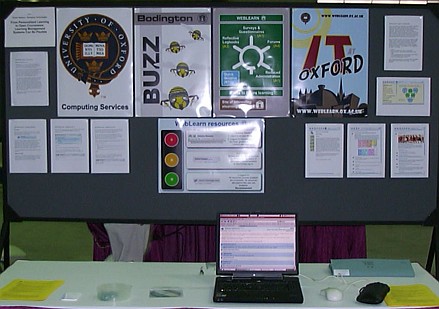E-Learning and Virtual Learning Environments
My field of work has been mainly e-learning in which for a long time I specialised mainly in Virtual Learning Environments (VLEs), also known as Learning Management Systems (LMS). For an introduction to this area that reflects my own experiences, please refer to a recent co-authored paper that appeared in the October 2011 issue of Gakushuin Economic Papers: An Introduction to Virtual Learning Environments (PDF) by P.Trafford and Y. Shirota.
I have also been engaged more specifically in mathematics e-learning systems, particularly for undergraduates in business and management who haven't studied much advanced maths in secondary school. Some notes below. My current interest in the architecture of social networking sites would also merit study with some particular facets in the context of learning that could be developed as its own branch (for further details see /etc).
Mathematics e-Learning
I have undertaken some joint research with Professor Yukari Shirota at the Faculty of Economics, Gakushuin University, in Tokyo. Prof. Shirota has been deploying computer algebra systems aided by Web-based visualization tools to help students' problem-solving ability. My input concerns the presentation of mathematical materials for the Web, especially with a view to targeting mobile devices, which students can use to review multimedia feedback. This led to a research visit in July 2011. Whilst in Gakushuin University, I gave a class on Game Theory.
- Trafford P. and Shirota Y. 2011. Requirements for Business Mathematics e-Learning System "How2SolveIt", presented at Japan Society of Business Mathematics annual conference, June 2011.
- Trafford P. and Shirota Y. 2011. Ubiquitous e-Learning: Designing Web Systems for Economics and Business Mathematics, Gakushuin Economic papers, Vol.48, No.2, pp. 111-128. It is available in HTML and PDF formats.
- A class in Game Theory for Management students - a blog post sharing what was for me a rare teaching experience!
VLE work at OUCS
I worked at Oxford University Computing Services (OUCS) between 2000 and 2008; the VLE was a recurrent theme from the interview until I left. When I arrived (at the then Humanities Computing Unit) I was asked to research and review various options for a departmental system, thereby introducing myself to some educational background, characteristics of tools and some of the intricacies of Oxford's educational structures!
At OUCS I was based in the Learning Technologies Group - generally found in the North end of the building. The main themes concern e-learning, virtual learning environments, Web development, handheld and mobile computing. The photo above is from a large Education/IT conference called Educause (it dwarfs any other HEI conference I've attended!)
 Between December 2002 and August 2008, I acted as 'VLE Administrator', looking after the day-to-day running of WebLearn, a centrally hosted
service available to staff and students here, myself included. At that time it was using as its underlying framework the Bodington open source software. Since then a new system has been adopted called Sakai, which has been augmented with some of the key architectural features of Bodington, and the VLE have since been engaged in the migration process.
Between December 2002 and August 2008, I acted as 'VLE Administrator', looking after the day-to-day running of WebLearn, a centrally hosted
service available to staff and students here, myself included. At that time it was using as its underlying framework the Bodington open source software. Since then a new system has been adopted called Sakai, which has been augmented with some of the key architectural features of Bodington, and the VLE have since been engaged in the migration process.
The range of responsibilities covered a bit of [Linux] system administration to support the VLE Team, VLE administration (mainly data mining of the database through Perl/SQL), Web-based admin of the VLE, support for other Admins of the VLE (covering more than 100 areas, which we call 'Floors' - Bodington uses a physical metaphor), help desk, marketing, training, presentations, and very occasionally a bit of development, but not [any more] in Java! You can gain some impression of what I did on daily basis by browsing my Educause Connect blog [archive] (with a few previous entries archived), which I used to jot various notes during the course of my work; it contains some brief reports on aspects of my work, which could cover anything from routine tasks to brief investigations of particular technologies and services.
In parallel to the VLE work, I investigated other complementary tools and services such as blogs and wikis, driven in large part by experiences from the RAMBLE project. This led on to consideration of 'PLEs' - which can be taken to stand for 'Personal Learning Environments.' It's a contentious area! Generally, I've been quite active in promoting open ways of working, a natural part of which is open source software. I'm hoping that this can pervade more my interest in mobile learning.
Open Courseware and Open Educational Resources
The Bodington software provides considerable flexibility, with a particular strength being its devolved hierarchy and access rights system. These have since been incorporated into Sakai, so I expect that many of WebLearn's resources continue to remain freely available and indexed by Google - no login required. At the same time, WebLearn provides for each user a personal space in which almost all the tools can be used. This prompted me to consider Open courseware, the original conception of which was MIT's OpenCourseWare (OCW). Since my initial forways, there has been considerable interest at large in the general subject of open educational resources, which have focused in particular on multimedia.
However, OCW is known to be expensive. After some reflection, it occurred to me that many aspects of Bodington show an organic way towards solving the problem. The following order is deliberate (not chronological)
- From Personalized Learning to Open Courseware: VLEs and Access Rights. This authorisation infrastructure, which has been recognised by others (see e.g. Michael Feldstein's posts reviewing Bodington - Part 1, Part 2). This granularity in design is, I think, key to the technical facilitation, with wider implications in Web2.0.
- Open Courseware in a few clicks - illustrating the mechanism that Bodington offers to very quickly release something to the open. However, it doesn't address the licensing issue!.
- Post poster reflections: openness and open courseware - in which I identify some barriers to broad adoption of open courseware
- The quest for sustainability in open courseware - seeks a bottom-up organic approach, but still operating within the institutional domain.
Web2.0-related articles
- PLEs meeting: Questions, many more questions, and a little more focus. Notes from a JISC CETIS meeting on PLEs
- PLEs as Environments for Personal and Personalised Learning (mini position paper) - I argue for letting 'PLE' retain a meaning independent of systems and technology.
- All aboard? Reflections on the 7th Sakai conference, Amsterdam - Sakai is gradually shedding its image as a developer-led alternative to Blackboard; I felt a sense of a growing and more widely participative community. I still have my doubts over its design w.r.t. Oxford's needs, but strong progress is definitely being made.
- The End of the LMS? Web 2.0: Preparing for a New Focus in E-Learning. [Slides are available (probably too many!)]. Paul Davis and I delivered this preconference seminar at EDUCAUSE 2007. We've identified some recurrrent themes, key questions, and a flexible process to evaluate blogs, wikis etc. There's no magic wand, though.
